
Wednesday morning, June 26, 2019
At Susquehanna’s Philadelphia office, we celebrate the summer each year with our “Night at the Ballpark” perfect for enjoying each other’s company and cheering on the Philadelphia Phillies. This year, the Phillies will be hosting the New York Mets at Citizens Bank Park.
To make the game more interesting, Susquehanna employees are asked to guess tonight’s final score.
- The employee with the correct answer wins $10,000 in Susquehanna’s “Night at the Ballpark Sweepstakes.”
- In case more than one employee correctly guesses the final scores, the time of the end of the game is used as a tie-breaking question.
- If no one correctly guesses the final scores, then no prize is awarded.
The deadline is 3pm this afternoon and as I prepare my guess, I thought I would share my thought process with you, the readers of Susquehanna’s gaming blog. For simplicity, I will ignore the tie-breaking question and assume that if multiple employees have the correct score, then the prize money is divided evenly (or equivalently awarded to a random person among those with the correct answer).
Market Data
At Susquehanna, we have great respect for the wisdom of the market. I am not a baseball expert, so I have no reason to second-guess the betting line on tonight’s game. Currently, Pinnacle’s Money Line reads

This market implies that the Phillies have a probability of about 59% to win the game.
Similarly, the “over/under” allows gamblers to bet on the total number of runs scored.

The over/under market represents the market’s opinion of the median number of runs. We can then adjust 10.5 by the odds given. Finally, we round the estimated run scoring in the direction of the small amount of skew in the total run distribution as a median-mean adjustment to estimate the final score of the Phillies and Mets with a total expectation of 10.9.
The Pythagenpat formula relates the probability of winning to the expected number of runs for each team.

Where p=59% is the probability of the Phillies to win the game, x is the mean number of runs the Phillies are expected to score, and thus 10.9-x is the mean number of runs the Mets are expected to score. Numerically solving this equation, we obtain:
Team Expected Runs
Philadelphia Phillies 5.95
New York Mets 4.95
Runs per Inning
Keith Woolner used empirical data from 1980 to 1998 to fit a model relating the expected number of runs per game to the distribution of runs in each inning. Given their market estimates for runs per game, his model provides the following distributions of runs per inning for each team.

The distribution for the Mets can then be convolved with itself 9 times while the Phillies distribution is convolved with itself 8 times it order to obtain the joint distribution of their scores after 8 ½ innings.
Probability of Score After 8½ Innings

In the case that the Phillies are leading after 8 ½ innings, the game is over, so we need to separate the upper right portion of the above distribution from the remainder of the distribution, and then convolve a Philly ½ inning onto the lower left portion of the above distribution (including the main diagonal).
We then obtain the following joint distribution for the scores after 9 innings of regular play:

However, the game cannot end in a tie, so we must separate the diagonal from the rest of the distribution and then add then convolve the diagonal with the runs per inning for each team in order to simulate the results of a possible 10th inning. We then repeat this procedure to account for the possibility of a tie after the 10th inning or 11th inning, and so on.
The result converge to the following joint distribution.
Probability of Final Score

The “expected value” of the scores of each time is Philadelphia 5.95, New York 4.95, but our model indicates that the most likely outcome is Philadelphia 4, Mets 3 with an estimated probability of 2.45%.
Strategic Play
While 4-3 might be the most likely outcome, there are plenty of other outcomes which are almost as likely. If many people happen to guess 4-3, then even if the game ends with that score, you might not win the prize. For example, if 31 people guess 4-3 (as was the case in Susquehanna’s sweepstakes on August 10, 2017) and the game has a 2.45% chance of ending with that score, then each person has a 2.45%/31 = 0.0791% chance of winning the $10,000 sweepstakes. This has an expected value of $7.91.
In 2017, 831 employees in the Philadelphia-area office participated in the contest. A few of the employees predicted scores that might have been more appropriate for an Eagles vs. Jets game.
Frequency of Final Scores Guessed by Employees in the August 10, 2017 Susquehanna Night at the Ballpark Sweepstakes

Assuming that the expectations in 2017 were the same as they are for today’s game, we can determine the expectation for each participant as $10,000 times the probability in the green table above divided by the frequency in the brown table above.
Expected Value of 2017 Estimates (Using 2019 Model)
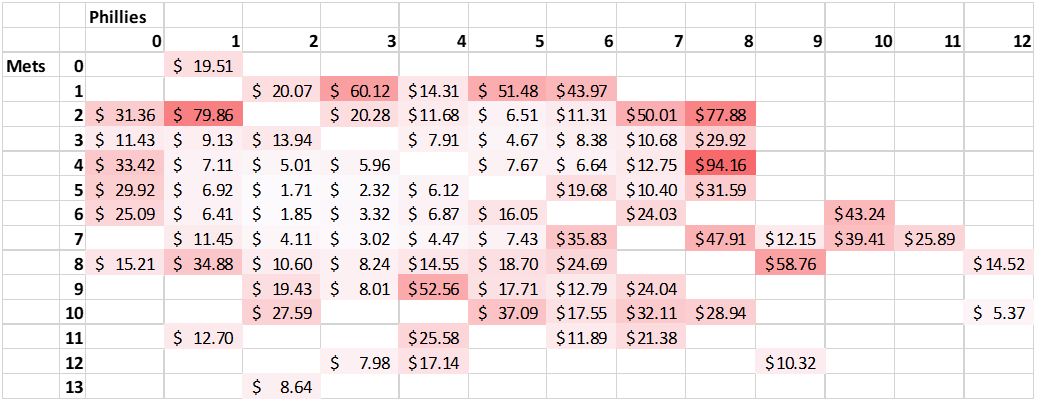
Since the 4-3 position is being shared among so many participants, each of them had only a modest expectation of $7.91. In contrast, the outcome Phillies 8 – Mets 4 had a lesser probability of only 0.94%, but only Cory made that prediction so he did not have to share the expectation ($94.16) with anyone else.
Nobody predicted the final outcome of Mets 10, Philadelphia 0, so no prize was awarded in the sweepstakes that year. Our model shows that there was almost a 71% chance of the final score being among the scores guessed by the employees.
Given our model and the guesses of the 831 employees, we can model what the expectation of a hypothetical 832nd participant would have been. If he picks final scores which no one had picked, then he gets all of the expectation to himself. If he makes a pick already chosen by N employees then the expectation must be divided N+1 ways. The resulting expectations are given below.
Expectation of Marginal Participant Using 2017 Estimates with 2019 Model
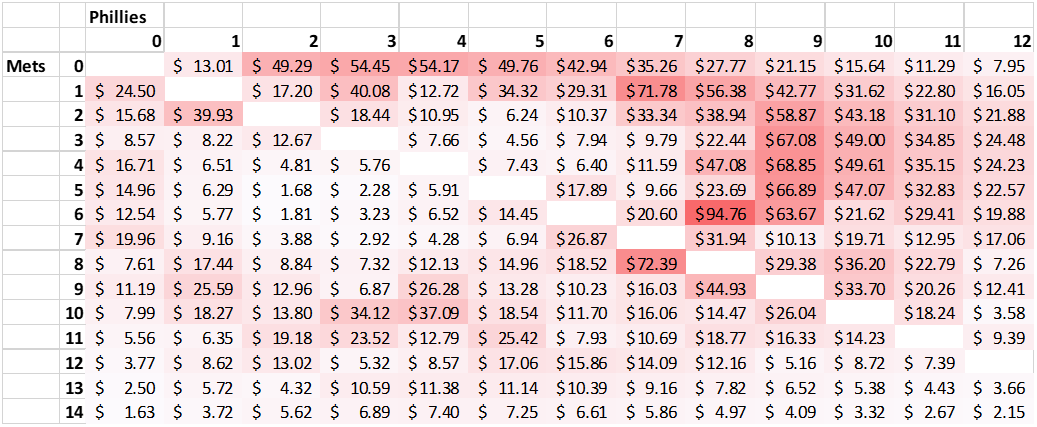
The highest expectation ($94.76) would have come by being the only employee to guess Phillies 8 – Mets 6. The actual final outcome of Phillies 0 – Mets 10 was quite unlikely a priori, so had someone made such a prediction his expectation would have been only $7.99.
In general, it appears we underestimate the possibility of a shutout, so I decided to bet on a shutout. According to the probability table above, the most likely shutouts would be a Phillies 4 – Mets 0 or Phillies 3 — Mets 0 shutout, with a probability of 0.54%. If (as in 2017) no one else makes one of these guesses, then my expectation would be $54, so I am planning to guess 4-0.
Final Entry
The tie breaking question is about the time of the end of the game. I am not going to put as much effort into that. However, in yesterday’s game the Phillies lost 8-12 after 3:07 of game time. Assuming that tonight’s game starts at the scheduled time (7:05pm), this would project an end time of 10:12pm. In reality, the first pitch is likely to be after the scheduled game start time of 7:05pm but a low-scoring 4-0 game won by the Phillies in 8 ½ inning would generally be shorter than a 8-12 defeat of the Phillies in 9 full innings. Accordingly, I will pick a somewhat earlier time. I know that many people like to guess round numbers, so I will guess an end time of 9:59:59pm in order to most effectively counter a potential guess of 10:00pm.

Afternoon Update
3pm.
The deadline has passed and now while we still do not know the result of tonight’s game, we can now see everyone’s predictions.
Frequency of Final Scores Guessed by Employees in tonight’s Susquehanna Night at the Ballpark Sweepstakes (June 26, 2019)
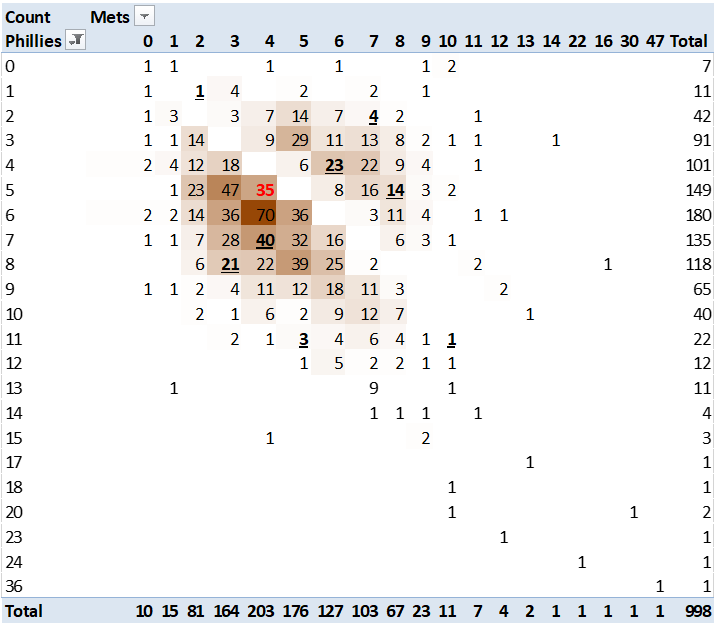
- Almost a thousand employees participated in the contest.
- The entries show a home team bias with 722 guessing that the Philadelphia Phillies would win, and only 275 guessing that the New York Mets would win. (1 person guessed that there would be a 0-0 tie which is impossible.)
- The average score predicted was 6.27 for the Phillies and 4.99 for the Mets.
- Here are the guesses with the highest expectation. All of them are guesses which were made by a single person.
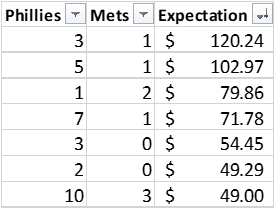
- 8-7 had the next highest expectation ($47.91). It was made by two people.
- My guess of 4-0 was shared with a single other person giving me an expectation of $27.09. The other person guessed a game end time of 10:47pm so I am hoping Philadelphia will win before 10:23:30pm with a score of 4-0.
- The total probability of all the results chosen adds up to 82.3%, so there is a 17.7% chance that no prize will be awarded. The mostly likely score which was not chosen was Phillies 1 – Mets 4 which has a probability of 0.78% or equivalently an expectation of $78.16.
- Several people guessed scores like 36-47, 20-30, 23-12, 24-22 or 20-10 which would have been more reasonable for a match between the Philadelphia Eagles and the New York Jets.
- Eight quants on Susquehanna’s sports desk “Jagger Analytics” made predictions. They are in bold and underlined on the table above.
Expected Value of 2019 Estimates
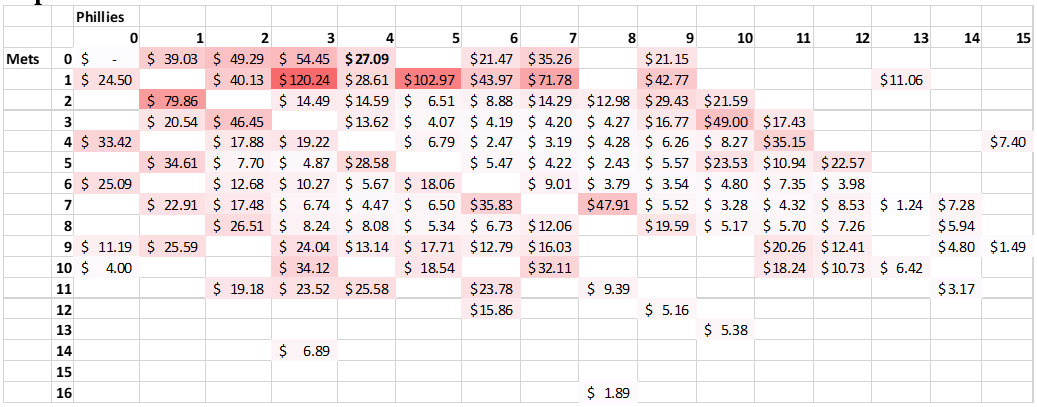
Expected Value of Scores Which Nobody Chose
Final Results
It was an exciting finish as the Philadelphia Phillies rallied back from a four-run deficit to force the game to go into extra innings. At on the bottom of the 10th inning, Phillies Right Fielder Jay Bruce hit a double to deep center field with runners on 1st and 2nd base allowing pinch runner Roman Quinn to score the game winning run.
A priori, the final result of Philadelphia Phillies 5, New York Mets 4 was relatively likely with a probability of 1.71% (9th highest). However, this result was selected by 35 participants. Accordingly, the tie-breaking rule came into effect. Participants had to guess the time at which the game ended. Guesses in the 5-4 bucket ranged from 8:49pm to 10:47pm with a mean of 10:02:45pm. Several end times were picked by multiple participants; in particular, 10:08pm was guessed independently by 5 participants.

The game ended at 10:26pm so the winning entry was from Maurice who was only off by one minute as he guessed the game would end at 10:25pm. With an extra $10,000, he can really celebrate the Phillies victory. Most participants underestimated the length of the game which is understandable as the game did go into extra innings. Only 3 participants overestimated the length of the game.

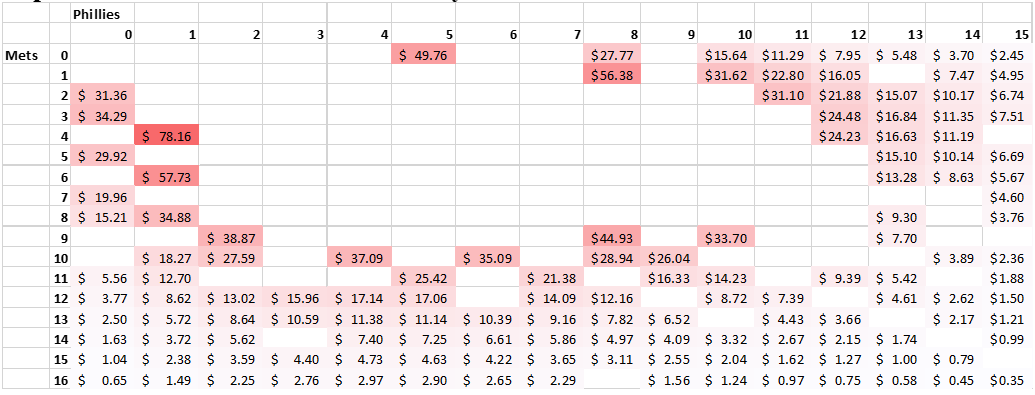

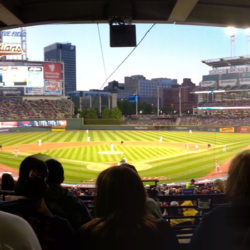
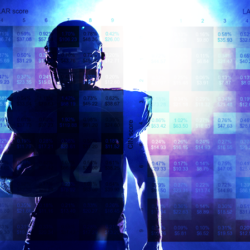
Subscribe Now
Get each new post sent straight to your inbox